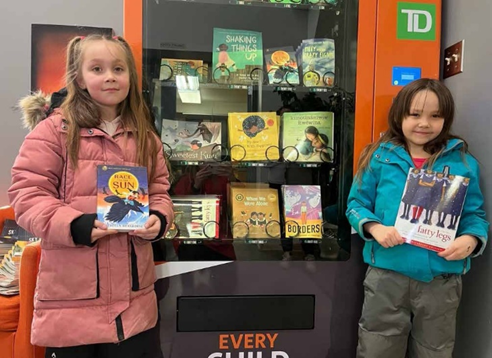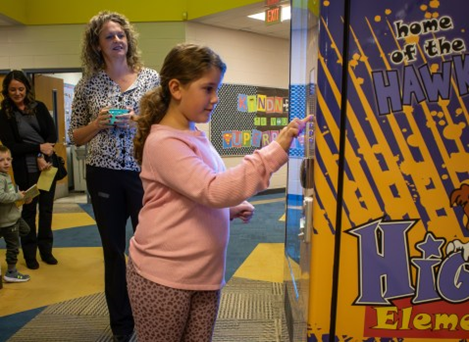Inchy’s Bookworm Vending Machine Program gets kids excited about reading. Schools, community centers, libraries, and many other facilities have successfully implemented it. That success is due, in no small part, to aligning with three crucial use cases:
1. Positive Behavioral Interventions and Supports (PBIS)
3. Social-Emotional Learning (SEL)
By integrating this program into your organization’s framework, you can enhance students’ overall learning experience. Additionally, you will create an inclusive environment where every student can thrive. Keep reading to learn how Inchy’s Bookworm Vending Machine Program aligns with your school’s education initiatives.
1. DEI
Prince Albert Indian and Métis Friendship Centre, Saskatoon, CA
Inchy’s Bookworm Vending Machine Program provides free and equitable access to books. By using golden Inchy tokens instead of money, every student, regardless of their background, enjoys their favorite books. A DEI book vending program ensures that all students have an equal opportunity to build their own personal libraries.
Schools have the flexibility to determine how they distribute tokens in a completely customizable program. By customizing the program for each school’s unique needs, they can achieve their goals in a fair and inclusive way.
The Prince Albert Indian and Métis Friendship Centre’s book vending machine is stocked with books by Indigenous authors.
The vending machine is part of a project by an organization called Start2Finish. This organization aims to raise awareness about different cultures in communities. Brian Warren, the founder of the organization told CTV News, this is the first machine of its kind in the province. It’s one of seven machines in Canada.

“It’s creating excitement for literacy and it’s creating a pathway of education,” Warren told CTV News. He explained that the goal is to make Indigenous content more accessible. That’s why the machines are placed in places where many people gather.
The machine is open to everyone and works with tokens. If someone is looking for a book, they can contact the Friendship Centre or the Bernice Sayese Centre. The books are for readers aged five to 18 and include picture books, chapter books, and books in Cree.
One of the books available is ‘When We Were Young’ by Indigenous author David Robertson. He believes that having these books easily accessible will help start conversations about reconciliation.
The partners will test the vending machine for three years and then decide if it should remain permanently. Stene hopes that the machine will reach over 2,000 readers during this time.
2. SEL
Higgins Elementary, Chesterfield, MI
Inchy’s Bookworm Vending Machine Program extends beyond literacy to support students’ social-emotional growth. With an SEL book vending program, teachers can carefully curate the collection of books available in the vending machine. This ensures that titles with social and emotional themes such as empathy, resilience, and self-awareness are included.
Students can choose books that resonate with their emotions and experiences, sparking meaningful discussions. This promotes a deeper understanding of themselves and others. With this use case, students have access to literature that connects with their emotions and experiences. It’s an exciting way to nurture a deeper understanding of themselves and others.

Francis A. Higgins Elementary School, in Michigan, will use the book vending machine as a positive incentive. The goal is to get kids excited about reading, promote good behavior, and show empathy toward others.
As reported to the Macomb Daily News, School administrators saw a company in Buffalo, NY that sells personalized book vending machines. The company inspired them.
The idea for Inchy’s Bookworm Vending Machine came from a meeting between a school assistant principal in New York and the president of Global Vending Group. They both wanted to bring books and families together through this new concept. Together they made a vending machine that gives a free book to students who are kind and behave well.
Thanks to their visionary idea, Higgins Elementary School students can earn a trip to the book vending machine. All they have to do is show good behavior, kindness, and reaching academic goals. This vending machine is a way to encourage students social and emotional development.
3. PBIS
Charter School For Applied Technology, Buffalo, NY
Inchy’s Bookworm Vending Machine seamlessly aligns with P.B.I.S framework schools already have in place.
Here’s how PBIS Rewards works:
- Teachers designate specific behaviors to reward. The book vending machine uses gold Inchy Tokens to reward students positive behavior.
- Students get rewarded with a token when they exhibit the designated behaviors.
- Students use the tokens to vend free books, building their home libraries.
This puts a focus on fostering a culture of acknowledgment and motivation. The opportunity to exchange these Inchy tokens for rewards reinforces their positive conduct, instilling a sense of achievement. As a bonus, students feel encouraged to make positive choices more consistently.
At the Charter School For Applied Technologies in New York, teachers and students embrace the PBIS book vending concept. Sandy Bogis is a first-grade teacher at the school. She told BookVending.com that her students insist on good attendance because they want to be rewarded with a trip to the book vending machine.
“I was teaching the Summer School program last year and we used that (the book vending machine) as an incentive. Summer School was optional but we did want students to attend every day. So we put all their names in a hat and told them ‘If you’re here every day this week, you might get picked for a trip to the vending machine. And one little boy came every day and said ‘I’m here do I get my ticket?’. He did win on the second week. The smile on his face when he got his book was just wonderful. The positivity around getting a book is just wonderful.” Bogis explained.
Guaranteed Results
By embracing these programs, educators can enhance their efficiency and reduce the time spent on behavior correction. This allows them to dedicate more of their valuable time to instruction. At the same time, they will cultivate a positive classroom atmosphere.
As the PBIS use case shows us, integrating Inchy’s Bookworm Vending Machine Program can liberate essential educational resources. Who wouldn’t want to enable educators to focus on their primary mission—educating and inspiring students?
